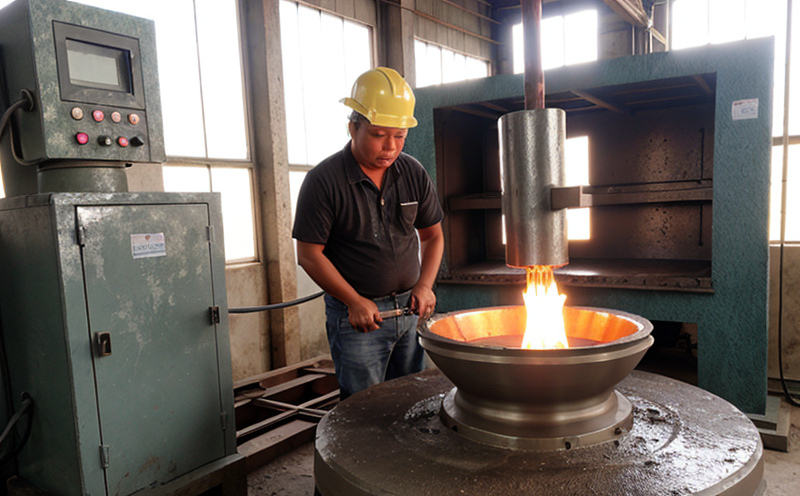ASTM E23 Charpy Impact Testing of Cast Steels
The ASTM E23 standard is a critical tool in the quality assurance process for cast steels, particularly when assessing their toughness and ductility. This testing method evaluates how well a material can absorb energy before fracture during an impact test. This article focuses on the ASTM E23 Charpy impact testing of cast steels, providing insights into its application, standards, and implications for industrial manufacturing.
The Charpy V-notch (CVN) impact test is widely used to determine the resistance to brittle fracture in materials under dynamic loading conditions. This type of testing is particularly important for cast steels as it helps ensure that the material can withstand sudden impacts without failing catastrophically, which is crucial for safety and performance in many industrial applications.
The ASTM E23 standard specifies the procedures for performing CVN impact tests on notched specimens. This ensures uniformity across different laboratories and facilities, thereby enhancing the reliability of the test results. The Charpy V-notch specimens are typically machined to a specific geometry, ensuring that they meet the precise requirements set by ASTM E23.
The testing process involves striking the specimen with a pendulum of known mass at a specified speed. The energy absorbed in this impact is measured and compared against predetermined acceptance criteria. For cast steels, these criteria are critical as they help identify materials that might be prone to brittle fracture under operational conditions.
In industrial manufacturing, the results from ASTM E23 Charpy impact testing can significantly influence product design and material selection. By ensuring that cast steel components meet or exceed specified toughness requirements, manufacturers can improve the overall safety and longevity of their products. This is especially important in industries such as automotive, aerospace, and construction where component integrity is paramount.
Understanding the nuances of ASTM E23 Charpy impact testing also allows quality managers to make informed decisions about material selection and process optimization. By identifying potential weaknesses early in the manufacturing process, they can implement corrective actions that enhance product reliability. This not only improves product performance but also reduces costly recalls and repairs.
Moreover, compliance officers benefit from this testing method as it helps ensure adherence to industry standards. Adherence to ASTM E23 is crucial for maintaining a good reputation in the market and ensuring regulatory compliance. In environments where safety regulations are stringent, such as those involving high-stress applications, ASTM E23 Charpy impact testing becomes an indispensable tool.
Applied Standards
| Standard | Description |
|---|---|
| ASTM E23-18a | This standard specifies the procedures for performing Charpy V-notch impact tests on metallic materials. The test measures the energy absorbed by a specimen in an impact fracture. |
| ISO 148-1:2019 | International Standard providing the procedure for tensile testing of metals at room temperature, which includes Charpy impact testing as one of its applications. |
Quality and Reliability Assurance
The ASTM E23 Charpy impact test plays a pivotal role in ensuring the quality and reliability of cast steels used in industrial manufacturing. By subjecting specimens to controlled impact conditions, this testing method provides valuable insights into the toughness properties of materials that are critical for performance under dynamic loading.
For industrial applications such as automotive components, aerospace structures, and construction equipment, the results from ASTM E23 Charpy impact testing can directly influence product design and material selection. This ensures that the final products not only meet but often exceed the specified toughness requirements set by industry standards.
The reliability of these tests is further enhanced through strict adherence to ASTM E23 guidelines. These guidelines ensure that all specimens are prepared and tested under consistent conditions, which in turn leads to more accurate and reproducible results. This consistency is crucial for quality control departments as it allows them to make informed decisions about material selection and process optimization.
By identifying potential weaknesses early in the manufacturing process, manufacturers can implement corrective actions that enhance product reliability. This not only improves product performance but also reduces costly recalls and repairs, thereby protecting both consumer safety and brand reputation. Furthermore, compliance officers benefit from this testing method as it helps ensure adherence to industry standards, which is crucial for maintaining a good reputation in the market and ensuring regulatory compliance.
Customer Impact and Satisfaction
The results of ASTM E23 Charpy impact tests have a direct impact on customer satisfaction by influencing product quality and reliability. By ensuring that cast steels meet or exceed specified toughness requirements, manufacturers can significantly improve the performance and longevity of their products.
For instance, in the automotive industry, where safety is paramount, ASTM E23 Charpy impact testing helps ensure that components such as engine blocks and transmission parts are resistant to sudden impacts. This not only enhances product reliability but also contributes to overall vehicle safety. In aerospace applications, similar considerations apply, with a focus on ensuring that materials used in critical components like landing gears and turbine blades can withstand extreme conditions without failure.
Additionally, the testing results provide valuable feedback for continuous improvement processes within manufacturing facilities. By identifying any deviations from expected performance early in the production cycle, manufacturers can implement corrective actions to enhance product quality. This proactive approach not only improves customer satisfaction but also builds trust and loyalty among end-users.
The reliability of products directly influences customer confidence in the brand. When customers know that their purchases meet or exceed stringent industry standards like ASTM E23, they are more likely to choose these products over alternatives. This increased confidence can lead to higher sales volumes, repeat business, and positive word-of-mouth recommendations.





